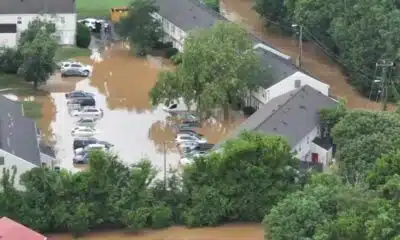News from the South - Alabama News Feed
Alabama bill would give law enforcement additional protection from lawsuits • Alabama Reflector
Alabama bill would give law enforcement additional protection from lawsuits
by Ralph Chapoco, Alabama Reflector
February 11, 2025
An Alabama lawmaker has filed a bill that could enhance immunity for law enforcement officers against civil litigation or criminal prosecution by establishing an additional court proceeding to determine immunity.
HB 202, sponsored by Rep. Rex Reynolds, R-Huntsville, chair of the Ways and Means General Fund Committee, allows police, sheriffs’ deputies and detention officers to have immunity from civil and criminal litigation if they were acting within the scope of their authority as law enforcement.
A message was left with Reynolds Monday seeking comment.
GET THE MORNING HEADLINES.
Under current statute, law enforcement officers are protected from tort litigation if their conduct aligns with the job but not if they act “willfully, maliciously, fraudulently, in bad faith, beyond his or her authority, or under a mistaken interpretation of the law.”
Reynolds’ bill would give law enforcement officers immunity while working at their jobs unless they behave recklessly or violate a person’s constitutional rights, an additional layer of protection than what is currently allowed in state law.
The bill would require a court to offer a law enforcement officer a pretrial hearing to determine whether the use of force was justified. It would also allow law enforcement to argue at the hearing that they are immune from prosecution.
“The case shall not proceed to trial until the court enters a written order setting forth reasons that the defendant lacks immunity from criminal prosecution under this section,” the bill states.
Should a court rule that the officer does not have immunity, law enforcement can appeal the decision to the Alabama Supreme Court.
The legislation is part of a package of bills dealing with law enforcement in the current legislative session. House members and the Senate will also discuss legislation related to Glock switches to help address homicide rates, as well as scholarships for dependents of law enforcement to help with recruitment efforts.
“Bolstering public safety is my number one priority this session, and I am proud to partner with Speaker Ledbetter and a bipartisan group of legislators in putting forward a package of bills that will back the blue and combat inner city gun violence,” said Gov. Kay Ivey during her State of the State address last week. “Working together, we will create a safer Alabama.”
Under Reynolds’ legislation, people pursuing a civil or criminal lawsuit against a law enforcement officer must prove wrongdoing and that law enforcement officers were acting outside their authority.
“The court must determine whether, if done for a proper purpose, the conduct was within, or reasonably related to, the outer perimeter of a law enforcement officer’s governmental discretion in performing his or her official duties,” the bill states.
According to language in the legislation, to file a civil lawsuit against law enforcement, the plaintiff must first cite the “legal authority” that creates the claims along with the factual allegations. Law enforcement can also refuse to comply with discovery in civil cases unless the motion to dismiss the alleged misconduct is frivolous, to preserve evidence, or to prevent undue prejudice or avoid justice.
Reynolds’ legislation allows law enforcement officers to ask a court to dismiss the suit or give summary judgment on the grounds that they have immunity and “shall entitle a law enforcement officer to mandamus relief from the Alabama Supreme Court.”
Russell Gold, a law professor at the University of Alabama, said the bill would likely “make bringing lawsuits against police officers even less likely,” citing qualified immunity, which protects not only law enforcement, but most government officials from liability when performing a job.
“I don’t have any reason to be concerned with frivolous lawsuits,” he said. “It is a tall order for someone to recover against a police officer. It is just a hard case to win.”
The bill would not have any effect on claims against law enforcement officers filed in federal court, the jurisdiction of many lawsuits filed against police.
Civil rights groups had some reservations about the bill.
“I am hopeful that legislators will thoughtfully consider the appropriate balance between the ability of law enforcement to keep our communities safe while ensuring that meaningful safeguards remain in place to hold those within the system accountable when they violate the trust placed in them,” said Jerome Dees, Alabama policy director for the Southern Poverty Law Center.
Rep. Juandalynn Givan, D-Birmingham, had concerns that offering immunity for individuals could make them less accountable when they engaged in misconduct.
“I believe everyone should have the right to seek judicial relief within the courts without the doors getting slammed in their faces,” she said. “Regardless of whether it is my profession or occupation, or another. We are continuing to further expand immunity.”
Law enforcement groups, including the Alabama Sheriffs Association, said they support the bill. Hoss Mack, executive director of the Sheriff’s Association, said some lawsuits go on for years, “even though the officer may be right.”
“Basically, you have someone out there waiting for something to handle over a period of years,” he said. “This could affect their careers or things of that nature.”
He also said it further defines the people who are covered by the legislation, such as tactical officers hired by police and sheriffs.
“If they do something wrong, they are still going to be prosecuted or they are still going to be sued,” Mack said. “It does not eliminate someone’s rights if that was to happen. This is just about those cases where there can be a predetermination as to whether they did or not.”
YOU MAKE OUR WORK POSSIBLE.
Alabama Reflector is part of States Newsroom, a nonprofit news network supported by grants and a coalition of donors as a 501c(3) public charity. Alabama Reflector maintains editorial independence. Contact Editor Brian Lyman for questions: info@alabamareflector.com.
The post Alabama bill would give law enforcement additional protection from lawsuits • Alabama Reflector appeared first on alabamareflector.com
News from the South - Alabama News Feed
High heat & spotty shower chances grow over the week
SUMMARY: Over the next week, limited tropical development is possible in the Gulf of Mexico, with a 10% chance in two days and 30% over seven days, likely within 3-4 days. A low-pressure trough off the South Carolina and Georgia coasts will bring heavy rain to Florida within 24 hours, moving into the Gulf by Tuesday. This system may develop into a storm, causing heavy rain and moderate to high rip currents along the Gulf Coast through midweek. Rain chances will increase, especially Wednesday to Friday, with scattered showers and storms expected. High heat persists early in the week, reaching 94°F with heat indices around 102-104°F.
High heat & spotty shower chances grow over the week
Subscribe to WVTM on YouTube now for more: https://bit.ly/2jvAaUD
Get more Birmingham news: http://www.wvtm13.com
Like us: https://www.facebook.com/WVTM13/
Follow us: https://twitter.com/WVTM13
Instagram: https://www.instagram.com/wvtm13/
News from the South - Alabama News Feed
Pensacola Vintage Fest draws a new crowd for “old school cool”
SUMMARY: The Pensacola Vintage Fest attracted a large crowd eager for “old school cool” finds, with attendees lined up before opening. The event offered a curated collection of unique vintage items, especially band shirts and memorabilia, all under one roof. Organizers liken it to “Goodwill on steroids,” saving visitors hours of searching. Shoppers come to reconnect with the spirit of past decades, drawn to vintage fashion and music from eras like the ’80s. The one-day festival featured numerous vendors, vibrant displays, and local charm, making it a standout celebration of nostalgia and retro culture in Pensacola.
The one-day event brings in people from around the region.
News from the South - Alabama News Feed
Floods are swallowing their village. But for them and others, the EPA has cut the lifeline.
by Ames Alexander, Floodlight, Alabama Reflector
July 13, 2025
Acre by acre, the village of Kipnuk is falling into the river.
The small Alaskan tribal village sits on permafrost, which is thawing fast as global temperatures rise. That’s left the banks of the Kugkaktlik River unstable — and more likely to collapse when floods hit, as they often do. Buildings, boardwalks, wind turbines and other critical infrastructure are at risk, according to Rayna Paul, the village’s environmental director.
So when the village learned late last year that it had been awarded a $20 million federal grant to protect the riverbank, tribal members breathed a sigh of relief.
But that relief was short-lived. On May 2, the U.S. Environmental Protection Agency canceled the grant. Without that help, Paul says, residents may be forced to relocate their village.
“In the future, so much land will be in the river,” Paul says.
Kipnuk’s grant was one of more than 600 that the EPA has canceled since President Donald Trump took office, according to data obtained by Floodlight through a Freedom of Information Act request. Through May 15, the cuts totaled more than $2.7 billion.
Floodlight’s analysis of the data shows:
- Environmental justice grants took by far the biggest hit, with more than $2.4 billion in funding wiped out.
- The EPA has also canceled more than $120 million in grants aimed at reducing the carbon footprint of cement, concrete and other construction materials. Floodlight reported in April that the cement industry’s carbon emissions rival those of some major countries — and that efforts to decarbonize the industry have lost momentum under the Trump administration.
- Blue states bore the brunt. Those states lost nearly $1.6 billion in grant money — or about 57% of the funding cuts.
- The single largest grant canceled: A $95 million award to the Research Triangle Institute, a North Carolina-based scientific research organization that had planned to distribute the money to underserved communities. RTI also lost five other EPA grants, totaling more than $36 million.
More cuts could be coming. The Washington Post reported in late April on a court filing that showed the EPA had targeted 781 grants issued under Biden. The data obtained by Floodlight shows the majority of those grants have already been canceled.
Lawsuit challenges grant cancellations
Two weeks ago, a coalition of nonprofits, tribes and local governments sued the EPA, alleging the Trump administration broke the law by canceling environmental and climate justice grants that Congress had already funded.
“Terminating these grant programs caused widespread harm and disruption to on-the-ground projects that reduce pollution, increase community climate resilience and build community capacity to tackle environmental harms,” said Hana Vizcarra, a senior attorney at Earthjustice, one of the nonprofits that filed the lawsuit. “We won’t let this stand.”
The EPA declined to comment on the lawsuit. But in a written response to Floodlight, the agency said this about the grant cancellations:
“The Biden-Harris Administration shouldn’t have forced their radical agenda of wasteful DEI programs and ‘environmental justice’ preferencing on the EPA’s core mission. The Trump EPA will continue to work with states, tribes, and communities to support projects that advance the agency’s core mission of protecting human health and the environment.”
Congress created the Environmental and Climate Justice Block Grant program in 2022 when it enacted the Inflation Reduction Act (IRA), President Joe Biden’s landmark climate bill. The program was designed to help the disadvantaged communities that are often hit hardest by pollution and climate change.
But on Jan. 20, Trump’s first day back in office, he signed an executive order halting funding under the IRA, including money for environmental justice, and canceling a Biden-era executive order that prioritized tackling environmental racism. Separately, in his orders on diversity, equity and inclusion, Trump called for the closures of all environmental justice offices and positions in the federal government.
Underserved communities are often the most vulnerable to climate impacts such as heat waves and flooding because they have fewer resources to prepare or recover, according to a 2021 analysis by the EPA.
Inside the agency, not everyone agrees with the new direction. In a “declaration of dissent,” more than 200 current and former EPA employees spoke out against Trump administration policies, including the decision to dismantle the agency’s environmental justice program.
“Canceling environmental justice programs is not cutting waste; it is failing to serve the American people,” they wrote.
On Thursday, the EPA put 139 of the employees who signed the petition on administrative leave, Inside Climate News reported.
From hope to heartbreak in Texas
The people at Downwinders at Risk, a small Texas nonprofit that helps communities harmed by air pollution, thought they were finally getting a break.
Last year, they learned that the EPA had awarded them a $500,000 grant — enough to install nine new air quality monitors in working-class neighborhoods near asphalt shingle plants, a gas well and a fracking operation in the Dallas-Fort Worth area. The data would have helped residents avoid the worst air and plan their days around pollution spikes.
But on May 1, the group’s three employees received the news they’d been dreading: Their grant had been canceled.
“It was a very bitter pill to swallow,” said Caleb Roberts, the group’s executive director.
He and his team had devoted more than 100 hours to the application and compliance process.
The nonprofit’s annual budget is just over $250,000, and the federal funding would have allowed the group to expand its reach after years of scraping by. They’d even paused fundraising for six months, confident the federal money was on the way.
“We feel like we’re at ground zero again,” Roberts said. “And that’s just very unfortunate.”
Floodlight is a nonprofit newsroom that investigates the powers stalling climate action.
Alabama Reflector is part of States Newsroom, a nonprofit news network supported by grants and a coalition of donors as a 501c(3) public charity. Alabama Reflector maintains editorial independence. Contact Editor Brian Lyman for questions: info@alabamareflector.com.
The post Floods are swallowing their village. But for them and others, the EPA has cut the lifeline. appeared first on alabamareflector.com
Note: The following A.I. based commentary is not part of the original article, reproduced above, but is offered in the hopes that it will promote greater media literacy and critical thinking, by making any potential bias more visible to the reader –Staff Editor.
Political Bias Rating: Center-Left
This article primarily critiques the policies of the Trump administration for canceling EPA environmental and climate justice grants, highlighting the adverse effects on vulnerable communities and tribal villages. The focus on environmental justice, climate change impacts, and criticism of cuts to federal funding aligns with a Center-Left perspective that emphasizes government responsibility in addressing climate change and supporting underserved populations. The article presents factual data but frames the issue with a sympathetic tone toward those affected by the grant cancellations, reflecting a bias toward progressive environmental policies and opposition to conservative administrative actions.
-
News from the South - North Carolina News Feed6 days ago
Learning loss after Helene in Western NC school districts
-
News from the South - Tennessee News Feed1 day ago
Bread sold at Walmart, Kroger stores in TN, KY recalled over undeclared tree nut
-
News from the South - Missouri News Feed6 days ago
Turns out, Medicaid was for us
-
Local News7 days ago
“Gulfport Rising” vision introduced to Gulfport School District which includes plan for on-site Football Field!
-
News from the South - Florida News Feed6 days ago
The Bayeux Tapestry will be displayed in the UK for the first time in nearly 1,000 years
-
News from the South - Louisiana News Feed7 days ago
With brand new members, Louisiana board votes to oust local lead public defenders
-
Mississippi Today4 days ago
Hospitals see danger in Medicaid spending cuts
-
News from the South - Missouri News Feed6 days ago
Leawood changes street tree ordinance, launches sidewalk repair program











































